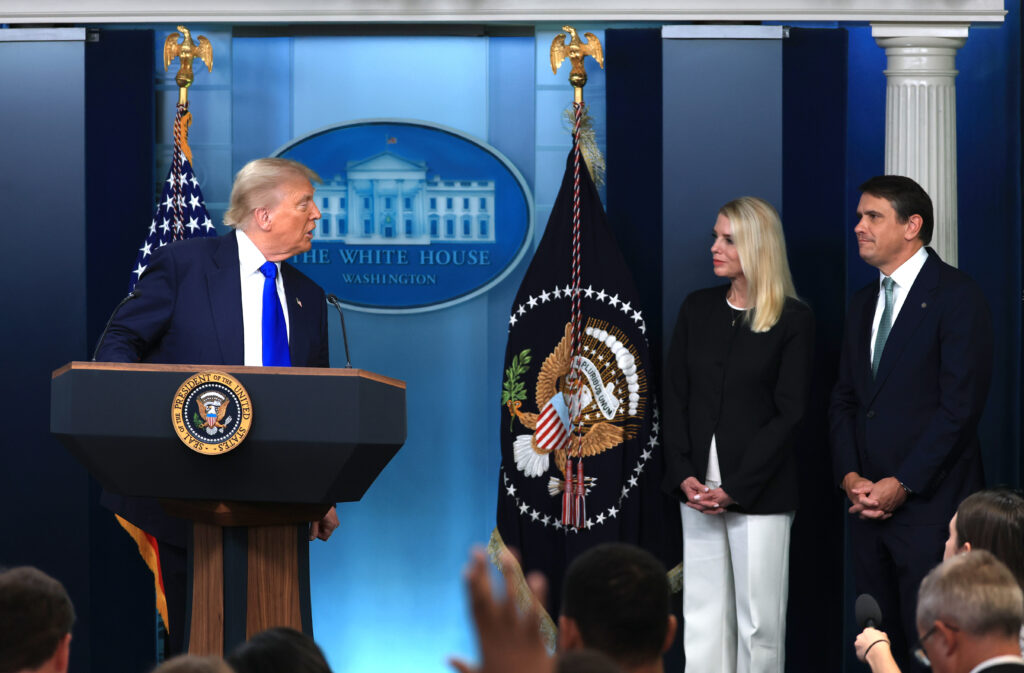Trump Admin Defying Court By Stonewalling on Anti-Voting Order, Plaintiffs Say

The Trump administration is defying a court order by refusing to say how federal agencies may be implementing President Donald Trump’s sweeping anti-voting executive order, pro-voting groups and Democrats alleged in a filing Friday.
Among the order’s directives that lawyers for the administration have failed to provide answers about: How is the Department of Homeland Security (DHS) allowing its databases to be used to purge voters? How will the U.S. Department of Justice (DOJ) punish states for continuing to offer a grace period for mail ballots that arrive after Election Day? And how will the U.S. Election Assistance Commission — an independent agency — withhold funds from states that don’t comply with aspects of the order?
“To this day, Defendants have failed to serve a single interrogatory response or make any specific objection to a particular interrogatory,” the groups challenging the order wrote, referring to written questions one party sends to another as part of the discovery process. They added that the Trump administration broke a court-mandated July 11 deadline in failing to respond.
Trump’s order seeks to fundamentally change how U.S. elections are administered. It would make it more difficult for eligible voters to register to vote and stay registered, kill off popular forms of voting and punish states that do not comply.
Though much of the order has been blocked by multiple federal judges, federal agencies appear to be moving forward with implementing aspects of it, while Republicans are using it as a framework to pursue anti-voting efforts at the state and local levels.
The Justice Department has sent several demands to states in recent months for access to their sensitive election and voting data, according to documents and emails obtained by Democracy Docket. In many of these demands, DOJ officials claim that they are collecting information as part of the department’s efforts to implement Trump’s order.
Several Republican-led states have introduced new efforts or passed legislation that appears to be consistent with Trump’s order, plaintiffs also highlighted.
As Democracy Docket reported, GOP state officials have described these strict new voting rules as efforts to comply with the presidential decree.
And DHS has worked with states, as well as anti-voting activists, to make it easier to access citizenship databases with the goal of removing noncitizens from the voter rolls.
The administration’s refusal to provide answers on the order’s implementation comes in a trio of cases brought by Democratic Party* and voting rights organizations, now consolidated before District Judge Colleen Kollar-Kotelly, appointed by former President Bill Clinton.
In April, Kollar-Kotelly blocked numerous aspects of the decree, finding that it vastly exceeded the scope of the president’s constitutional powers. Weeks later, the judge allowed plaintiffs to question the Trump administration on how it is implementing the order.
That information, the plaintiffs said, would help the court determine whether the challenged provisions have matured into an actual controversy and are ready for judicial review.
Plaintiffs sent the DOJ two questions, including one asking the department to clarify how it would carry out Trump’s command that Attorney General Pam Bondi “take all necessary action” against any states that count absentee or mail-in ballots received after Election Day.
DHS received four queries on how its citizenship databases are being used, or will be used, to purge state voter registration rolls, what its databases contain and whether data has been shared with the Department of Government Efficiency.
Plaintiffs also asked the EAC — an independent bipartisan agency — two questions on whether it has made any effort to withhold election assistance funding from states that do not comply with aspects of Trump’s order.
The plaintiffs also asked the agencies to detail any communications they’ve had with state and local officials concerning Trump’s order.
Despite Kollar-Kotelly’s July 11 deadline, the Trump administration did not respond. Instead, emails show that the Trump administration broadly objected to the requests, claiming that plaintiffs asked too many overly broad questions.
“The volume of the interrogatories violates Rule 26’s proportionality requirement, and they are contrary to the Court’s order in these particular cases, which allowed only ‘targeted’ discovery on ‘certain’ claims limited to the issues of ripeness and justiciability,” wrote Bridget O’Hickey, a Justice Department lawyer, in a July 9 email. “Therefore, we cannot respond to the interrogatories as presently drafted.”
Plaintiffs told Kollar-Kotelly that the Trump administration’s “boilerplate” opposition to the inquiries indicates that it lacks specific objections and is instead refusing to answer.
“Because Defendants have refused to make specific objections or serve any responses to Plaintiffs’ interrogatories, the Court should find that Defendants have waived any such objections (or otherwise overrule them) and compel Defendants to respond in a timely and complete manner,” they said.
If she approves plaintiffs’ motion, Kollar-Kotelly could force the Trump administration to publicly disclose exactly how it’s carrying out Trump’s order.
*Elias Law Group (ELG) is representing the Democratic Party. ELG Firm Chair Marc Elias is the founder of Democracy Docket.